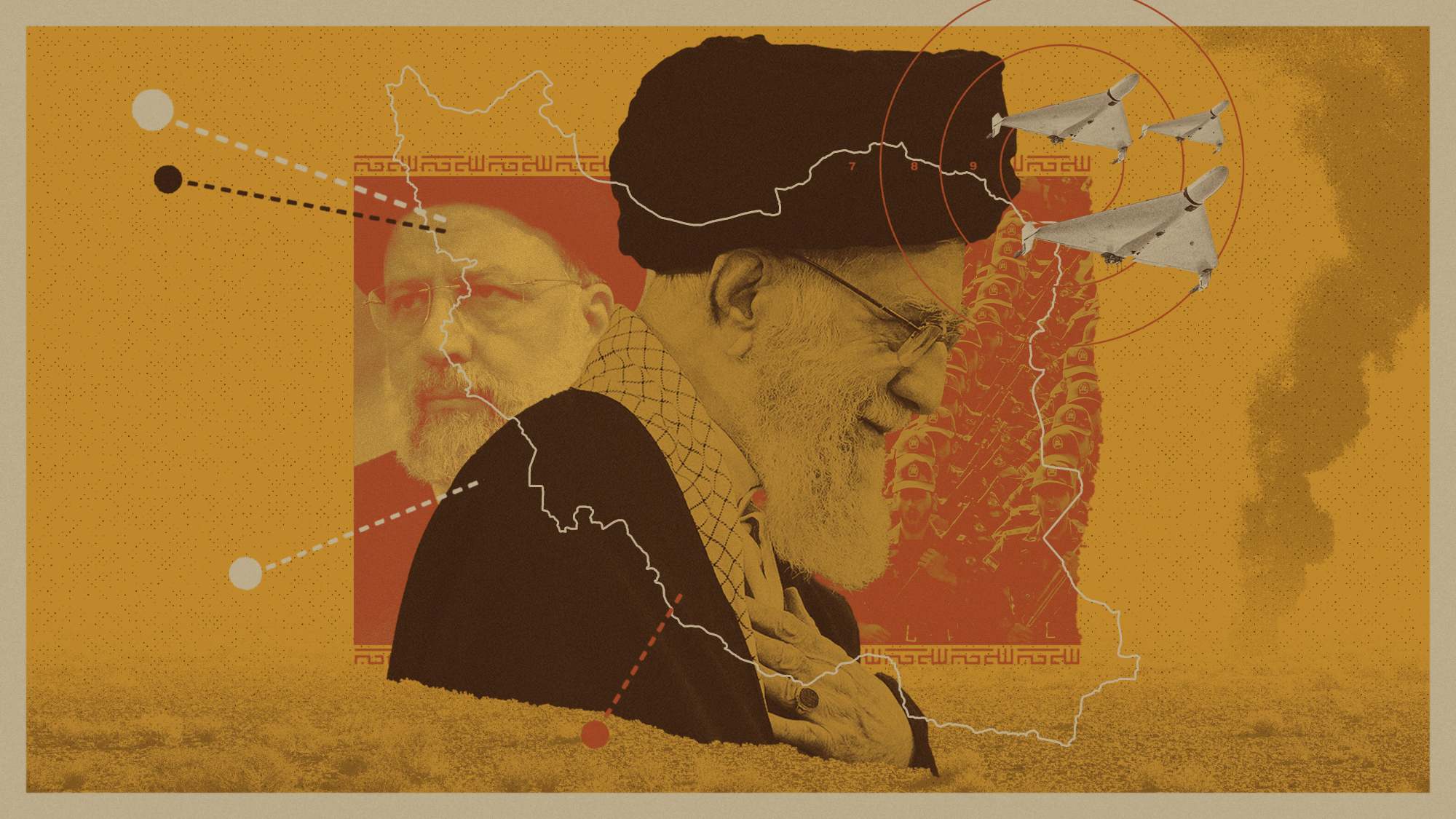How powerful is Iran?
Islamic republic is facing domestic dissent and 'economic peril' but has a vast military, dangerous allies and a nuclear threat

A free daily email with the biggest news stories of the day – and the best features from TheWeek.com
You are now subscribed
Your newsletter sign-up was successful
"No move by any enemy against our sacred system goes unanswered," said Iran's supreme leader, Ali Khamenei, after Israel's deadly strike on the Iranian consulate in Syria two weeks ago.
Iran answered with its first ever direct attack on its long-time foe Israel, launching a barrage of drones and missiles and crossing what for decades was an "unthinkable red line", said Politico. The Islamic Revolutionary Guard Corps, Iran's powerful militia, claimed responsibility for the strikes, calling them retaliation for Israel's 1 April attack on the Iranian consular building in Damascus that killed several of its commanders and its chief regional official.
The Israeli military, with allies including the US and the UK, destroyed most of the Iranian missiles in "an impressive display of force", said Sky News's security and defence editor Deborah Haynes, utilising Israel's famed Iron Dome defence system. But such a feat "could not be guaranteed to be as successful" if Iran were to launch more attacks in response to any Israeli retaliation.
The Week
Escape your echo chamber. Get the facts behind the news, plus analysis from multiple perspectives.

Sign up for The Week's Free Newsletters
From our morning news briefing to a weekly Good News Newsletter, get the best of The Week delivered directly to your inbox.
From our morning news briefing to a weekly Good News Newsletter, get the best of The Week delivered directly to your inbox.
What did the commentators say?
Despite Iran's "superior numbers", Israel's military hardware is "far more sophisticated", said the Financial Times. That's why Khamenei has long avoided direct conflict with Israel, and "relied on asymmetrical warfare" and regional proxies like Hezbollah in Lebanon, Houthi rebels in Yemen and Hamas in Gaza, as well as militias in Iraq and Syria.
This attack, although unprecedented, was a "clearly telegraphed" display of force, calibrated to restore Iran's deterrent and bolster its image among its proxies. Iran offered proof that it would "back its threats", but signalled that it wanted to avoid any escalation with the US, or a full-scale war with Israel.
That's a scenario the Islamic republic would likely not survive, said Daniel Markind in Forbes. The currency has "crashed" since the Damascus attack, losing 30% of its value. The country "faces potential economic peril", long battered by Trump-era sanctions, and is increasingly polarised, with rising discontent against the repressive regime and reluctance to go to war.
But this was still "a bigger attack than many analysts expected", said the BBC's international editor Jeremy Bowen. The fact that Israel and its allies shot down almost all of the drones may make it harder for Iran to restore its "sense of deterrence" lost in the Damascus attack.
A free daily email with the biggest news stories of the day – and the best features from TheWeek.com
Indeed, the fact that Iran struck at all was evidence of an "increasingly emboldened" authoritarian state, said Haynes on Sky News. Iran has also won itself "a diverse array of allies around the world", from communist North Korea to socialist fellow oil-sanctioned Venezuela, said Richard Spencer in The Times.
For all its militias, Iran "has little in the way of brute force to compete with the American navy or even the Israeli air force, if it comes to out-and-out combat". But Hezbollah, Iran's Lebanese proxy and greatest ally, "has no rival strong enough to disarm its massive arsenal of missiles pointed at Israel".
In fact, Israel's success could lead Iranian military officials to conclude "they need more powerful weapons", said David E. Sanger, a Middle East and superpower conflict reporter, for The New York Times. "And they may conclude that their logical next step is to move – overtly or covertly – toward a nuclear weapon."
Iran's "limited response" to the Damascus strike may well reflect "the imbalance of power in Israel's favour", said Trita Parsi, an Iran analyst and co-founder of the Quincy Institute for Responsible Statecraft think tank, on X. "But think further and you'll realise how this episode will strengthen those in Tehran who believe Iran must go nuclear."
What next?
The Iranians have signalled that, in their mind, "the incident is over", said Sanger, having avenged the deaths of its commanders. But "over" could simply refer to "an end to the missile barrage, not other forms of escalation".
Experts say Iran has "every incentive to proceed with its nuclear program, both to taunt the West and to build what it always calls its 'deterrent' against Israel", the region's other undeclared nuclear weapons state. The best case scenario would be that Iran "recognizes the danger" too.
But Netanyahu's Israel "has proven increasingly unpredictable", said Tamara Qiblawi on CNN. Iran's threats of more severe action in case of escalation "may fall on deaf ears in Israel, to its own peril".
Harriet Marsden is a senior staff writer and podcast panellist for The Week, covering world news and writing the weekly Global Digest newsletter. Before joining the site in 2023, she was a freelance journalist for seven years, working for The Guardian, The Times and The Independent among others, and regularly appearing on radio shows. In 2021, she was awarded the “journalist-at-large” fellowship by the Local Trust charity, and spent a year travelling independently to some of England’s most deprived areas to write about community activism. She has a master’s in international journalism from City University, and has also worked in Bolivia, Colombia and Spain.